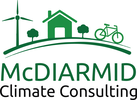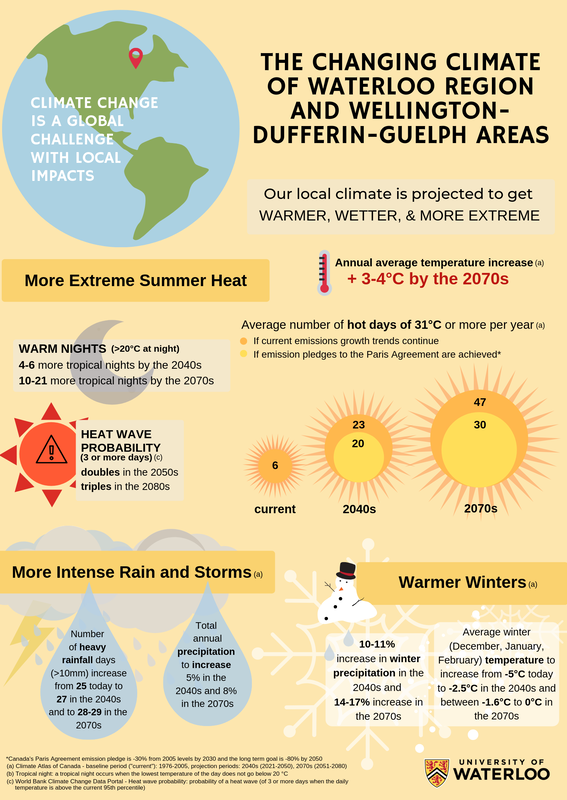|
The University of Waterloo has put out a handy infographic showing the projected changes to the climate for Waterloo Region and Wellington-Dufferin-Guelph areas. The projections are based on multiple climate models and represent our best current understanding of climate systems.
The general message is that we can expect to see warmer, wetter and more extreme weather in the coming decades in our region. How much change we observe still depends on how fast the global community is able to reduce its greenhouse gas emissions. The infographic shows projections that consider both a business as usual scenario and a scenario in which the World meets its Paris Agreement pledges[1]. When it comes to average annual temperatures, we can expect to see a rise of 3-4°C by mid to late century (2051-2080) relative to a baseline period of 1976 to 2005 (climate scientists work with 30 year periods when comparing conditions). Historical temperature readings from local weather stations suggest that we have experienced an average 0.4°C temperature rise since 1915, so this is a significant deviation from what we have already experienced. In the summertime, that rising annual temperature will bring some very hot weather. The average number of days we call very hot (31°C or more) are expected to rise from an average of 6 in recent years, to 20-23 early to mid-century (2021-2050) and 30-47 mid to late century (2051-2080). Those hot days will be accompanied by tropical nights, adding an average additional 4-6 days when temperatures do not fall below 20°C during the day or night by 2021-2040. For later in the century (2051-2080), that number rises to 10-21. Heat waves, defined as three or more days of very high temperatures are set to double and triple by mid and late century. This is a recipe for heat-related illnesses and even death in vulnerable populations: the young, the elderly, the ill, and those without access to air conditioning. Winters will also get warmer in the Waterloo Region. Average winter temperatures are projected to rise from the current -5°C to an average -2.5°C by early to mid-century (2021-2050) and to an average of -1.6°C to 0°C by mid to late century (2051-2080). This will be accompanied by an increase in precipitation (10-11% for 2021-2050 and 14-17% for 2051-2080). Warmer winters and more precipitation likely means more freezing rain and ice storms (my interpretation). And with temperatures increasingly fluctuating above and below the freezing point, it seems likely that there will be less snow accumulation: a forecast that has implications for our crops and our ecosystems. When it comes to precipitation, Waterloo region can expect to see a modest annual increase: 5% for 2021-2050, and 8% for 2051-2080. As noted above, much of that increased precipitation will fall in the winter. In the other seasons, it is expected that more of the precipitation will come in the form of intense storms with the number of heavy rainfall days (>10mm) increasing from the average of 25 today to an average of 27 (2021-2050) then 28-29 (2051-2080). These are the types of intense rain events that can cause rivers to swell, roads and basements to flood, and communities to be thrust into a state of emergency. While the projections for our area are not pretty, we can grateful that we live in an area that is expected to see relatively modest climate change impacts. We will not be directly affected by sea level rise, our region is not expected to become a desert and the projected temperatures are still well within the livable human range. But if we want a good life for ourselves and our children, we will need to do two things. First, we will need to cut our greenhouse gas emissions to near zero by mid-century: climate mitigation. Secondly, we will need to start planning for a different climate: climate adaptation. [1] Canada pledged to cut emissions by 30% below 2005 levels by 2030 and by 80% by 2050. Here in the Region of Waterloo, we have pledged to cut emissions by 6% below 2010 levels by 2020 and by 80% by 2050.
0 Comments
|
Archives
January 2021
Categories |


 RSS Feed
RSS Feed